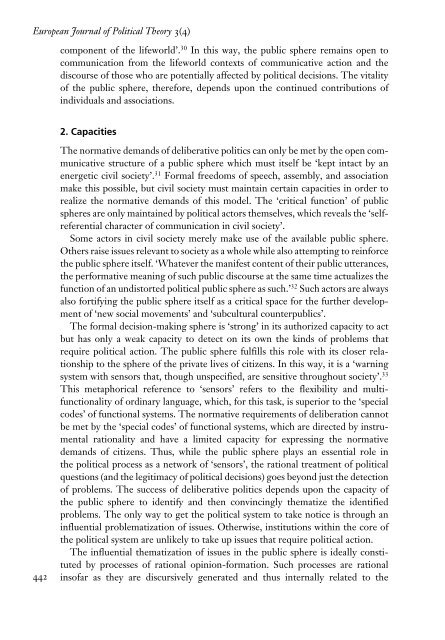Communicative Power in Habermas's Theory of Democracy
Communicative Power in Habermas's Theory of Democracy
Communicative Power in Habermas's Theory of Democracy
Create successful ePaper yourself
Turn your PDF publications into a flip-book with our unique Google optimized e-Paper software.
European Journal <strong>of</strong> Political <strong>Theory</strong> 3(4)component <strong>of</strong> the lifeworld’. 30 In this way, the public sphere rema<strong>in</strong>s open tocommunication from the lifeworld contexts <strong>of</strong> communicative action and thediscourse <strong>of</strong> those who are potentially affected by political decisions. The vitality<strong>of</strong> the public sphere, therefore, depends upon the cont<strong>in</strong>ued contributions <strong>of</strong><strong>in</strong>dividuals and associations.2. Capacities442The normative demands <strong>of</strong> deliberative politics can only be met by the open communicativestructure <strong>of</strong> a public sphere which must itself be ‘kept <strong>in</strong>tact by anenergetic civil society’. 31 Formal freedoms <strong>of</strong> speech, assembly, and associationmake this possible, but civil society must ma<strong>in</strong>ta<strong>in</strong> certa<strong>in</strong> capacities <strong>in</strong> order torealize the normative demands <strong>of</strong> this model. The ‘critical function’ <strong>of</strong> publicspheres are only ma<strong>in</strong>ta<strong>in</strong>ed by political actors themselves, which reveals the ‘selfreferentialcharacter <strong>of</strong> communication <strong>in</strong> civil society’.Some actors <strong>in</strong> civil society merely make use <strong>of</strong> the available public sphere.Others raise issues relevant to society as a whole while also attempt<strong>in</strong>g to re<strong>in</strong>forcethe public sphere itself. ‘Whatever the manifest content <strong>of</strong> their public utterances,the performative mean<strong>in</strong>g <strong>of</strong> such public discourse at the same time actualizes thefunction <strong>of</strong> an undistorted political public sphere as such.’ 32 Such actors are alwaysalso fortify<strong>in</strong>g the public sphere itself as a critical space for the further development<strong>of</strong> ‘new social movements’ and ‘subcultural counterpublics’.The formal decision-mak<strong>in</strong>g sphere is ‘strong’ <strong>in</strong> its authorized capacity to actbut has only a weak capacity to detect on its own the k<strong>in</strong>ds <strong>of</strong> problems thatrequire political action. The public sphere fulfills this role with its closer relationshipto the sphere <strong>of</strong> the private lives <strong>of</strong> citizens. In this way, it is a ‘warn<strong>in</strong>gsystem with sensors that, though unspecified, are sensitive throughout society’. 33This metaphorical reference to ‘sensors’ refers to the flexibility and multifunctionality<strong>of</strong> ord<strong>in</strong>ary language, which, for this task, is superior to the ‘specialcodes’ <strong>of</strong> functional systems. The normative requirements <strong>of</strong> deliberation cannotbe met by the ‘special codes’ <strong>of</strong> functional systems, which are directed by <strong>in</strong>strumentalrationality and have a limited capacity for express<strong>in</strong>g the normativedemands <strong>of</strong> citizens. Thus, while the public sphere plays an essential role <strong>in</strong>the political process as a network <strong>of</strong> ‘sensors’, the rational treatment <strong>of</strong> politicalquestions (and the legitimacy <strong>of</strong> political decisions) goes beyond just the detection<strong>of</strong> problems. The success <strong>of</strong> deliberative politics depends upon the capacity <strong>of</strong>the public sphere to identify and then conv<strong>in</strong>c<strong>in</strong>gly thematize the identifiedproblems. The only way to get the political system to take notice is through an<strong>in</strong>fluential problematization <strong>of</strong> issues. Otherwise, <strong>in</strong>stitutions with<strong>in</strong> the core <strong>of</strong>the political system are unlikely to take up issues that require political action.The <strong>in</strong>fluential thematization <strong>of</strong> issues <strong>in</strong> the public sphere is ideally constitutedby processes <strong>of</strong> rational op<strong>in</strong>ion-formation. Such processes are rational<strong>in</strong>s<strong>of</strong>ar as they are discursively generated and thus <strong>in</strong>ternally related to the
















